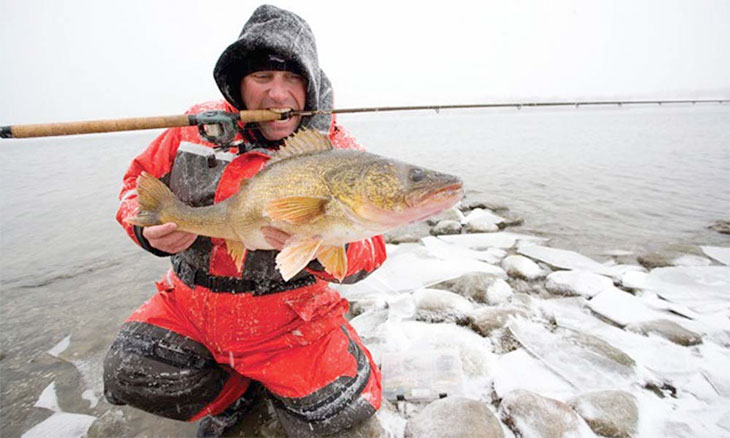By Dave Mercer
from issue 27-1
Chasing the Giant Fish of Winter
Okay, I’ll be honest. As a competitive angler, maybe I’m a little biased. But I really believe that anglers are some of the toughest, most resilient people put on earth. Unlike baseball, we don’t have rain delays and don’t even get me started on golf. You can never trust a sport where water is a hazard. It doesn’t matter what part of this country you are from because if the fish are biting, anglers will figure out a way to catch them.
Now this time of year, generally when most people think of fishing, they think of ice fishing. Don’t get me wrong; ice fishing is a great alternative, but if you ask me, nothing beats the feeling of launching your boat and actually casting. And hey! How much sense does it make to put an ice fishing article in a magazine called Power Boating Canada? Now, I know what some of you are thinking; ‘How in the world is this guy going fishing in his boat when most of the lakes, rivers and streams are frozen?!’ My answer to you is simple; the expressed word in the previous sentence is ‘most’. Which means that some of our lakes, rivers and streams are wide open. And due to the extra work and effort it takes to launch a boat, the fish that live in them are experiencing very little pressure and are prime for the picking.
But before we talk about all the hard work, lets talk about the easy part – finding an area to fish. Plain and simple; any area with open water, with a legal season still open is what you want to target. Usually, there’s one of two reasons that these bodies of water have not frozen; moving water or some of these winter hotspots are exactly that – hotspots. Areas where the water is warmer than any other part of the lake due to a warm water discharge such as a power station. Come the winter months, these areas are actually home to more fish than any other time of the year. Not only do more fish live there but, the fish that live there in the winter are more active due to the summer-like water temperatures they are living in. So not only does the warm water discharge stop that area of the lake from freezing but it also sounds a dinner bell that fish sense from miles around.
Now its time for the work -no if, ands or buts about it – fishing this time of year is not for the faint of heart. To do it effectively and most importantly, safely, there’s a whole bunch of precautions that you need to keep in mind.
First there is no way any angler should step foot into a boat during the winter months without first putting on a quality Coast Guard approved survival suit. Not only will this keep you warm and comfortable, but if by some mishap you should happen to fall into the water, a survival suit will actually save your life. However, long before you step foot in the boat, you have to actually get the boat in the water. What is basically a simple, easy task in the warmer months can at times become the most challenging aspect of winter fishing. This is going to be your first encounter with the number one enemy of the open water winter angler – ICE. On a cold winter day boat ramps that are totally dry in the morning, can quickly turn into a luge track after a few dripping wet boats get pulled out of the water. One easy way to combat this is to always carry a few bags of sand in the back of your tow vehicle. Not only will this give you extra weight resulting in extra traction, but if things get really slick you can spread the sand over the ice and finally get fishing. However, now just because you are on the water, don’t think that Mr. ICE has forgotten about you. Because about ten or fifteen casts into your trip, he’ll quickly remind you that he hasn’t gone anywhere. That reminder is going to come in the form of ice forming on the guides of your rod and reel. Each time you cast, a tiny spray of water shoots off your line and coats your guides with a thin layer of ice. In time that thin layer will not only limit your cast, but its sharp edges can actually damage or knick your line resulting in lost fish. The solution? Make sure to pack a small container of Vaseline. Coating each guide will limit ice ever forming on your guide and allow you to effectively fish regardless of how cold the air temperature is.
Lastly and some would say most importantly, the next time you encounter the dreaded villain of ice is going to actually be after you get off the water. As soon as you load your boat and are getting ready to head back to your comfy home to enjoy a warm glass of hot cocoa, there’s one last precaution you need to keep in mind to protect your outboard motor. Make sure to trim your motor completely down and drain all the water out of the lower unit. This may take a few minutes but may seem longer, especially if you’re cold, but this is definitely not something you want to rush. Because just like your elementary school science teacher taught you, when water freezes and becomes ice, it expands. Inside the lower unit of your outboard, that expansion will cause damage and shrink your bank account.
For some of you this may be starting to sound like way too much work. But if you prepare, take the right precautions and keep safety in mind, the giant fish of winter will make it all seem worthwhile.

